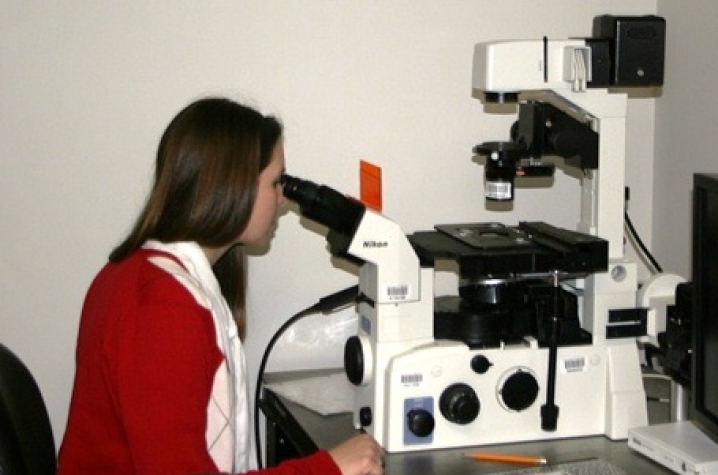Student Hopes to Help Others with Same Disease

LEXINGTON, Ky. (May 17, 2011) − Since she was 9 years-old, University of Kentucky sophomore Lindsey Shipp has known what she wanted to do when she grew up. She made that decision in a hospital room not long after she was diagnosed with Type-1 diabetes. Inspired by a caring team of doctors and a prayer, she knew she wanted to become an endocrinologist and teach other people how to live with diabetes.
Shipp, an anthropology major from Dry Ridge, is in many ways a typical college student. She loves her French class and studying different cultures, has a part-time job at the Johnson Center and squeezes in a game of golf when she can. What's not typical about Shipp is the tiny box the size of a pager that sits at her waist and feeds her body insulin through a tiny tube [inserted in her abdomen.
Shipp has lived with diabetes for 10 years, and the last eight of those years she has worn an insulin pump. Every day, Shipp pricks her finger to test her blood sugar five to 10 times a day and that number is then sent to the pump. She programs in the number of carbohydrates she eats during a meal or snack and the pump figures out how much insulin her body needs to keep her blood sugar in the normal range. While this process may seem daunting to many people, it's just become routine for Shipp.
"Technology is wonderful," Shipp said referring to the pump's ability to calculate her insulin requirements so she doesn't have to. "I was on shots the first two years but I went on the pump in middle school which made my life a lot more flexible."
Shipp experiences highs and lows in her blood sugar that can't always be explained and that can be disruptive when you lead an active life. "I was on the golf team and it was important to keep my levels under control," she said.
Controlling her blood sugar is still a difficult task for Shipp and she said it's hard finding time in her busy schedule to write down her blood sugars and look at the patterns to figure out what's going on. However, she believes she can use her experience to one day help her relate to her patients.
Through the years dealing with her diabetes, Shipp has developed a strong determination to control the disease and not let the disease control her. Her personal experience only fuels her desire to become an endocrinologist and a diabetes researcher. Even now as a college sophomore, Shipp is already advancing toward that goal through her volunteer work in a Barnstable Brown Kentucky Diabetes and Obesity Center's research laboratory.
Currently, she is assisting researchers investigating a possible link between fat and muscle inflammation and Type 2 diabetes. Shipp describes the work as fun and interesting as it offers a new perspective to the Type-2 side of diabetes.
Shipp is looking forward to the first Barnstable Brown Obesity and Diabetes Research Day for physicians, staff and students on May 17 in the new Pavilion A of UK Chandler Hospital and hopes someday to be a participant.
As for the future, Shipp doesn't think about it as much as she does getting past organic chemistry, hitting the driving range as soon as finals are over and summer classes and work in the research lab. She does venture to say that maybe one day she would like to be in private practice with other doctors, a nutritionist, nurse practitioners "…because that's what it takes, a whole team," she said.
Shipp's advice to any student living with diabetes is to "go out and be yourself and don't let it stop you."
MEDIA CONTACT: Ann Blackford, (859) 257-1754 ext. 230 or ann.blackford@uky.edu




